Orientation for Success: Reflection and Feedback in Higher Education
VerifiedAdded on 2023/06/08
|8
|2039
|83
Essay
AI Summary
This essay examines the crucial role of reflection and feedback in higher education, focusing on the Gibbs reflective cycle as a framework for enhancing learning. The essay delves into the significance of reflective learning for academic success, emphasizing its impact on developing critical thinking and self-awareness. It explores the benefits of both feedback and feed-forward approaches, highlighting their contributions to improving formative and summative assessments. The essay also discusses the importance of student engagement, teacher support, and the application of reflective practices to promote academic development. The essay concludes by emphasizing the importance of reflection, feedback, and feed-forward for fostering personal and professional growth in higher education.
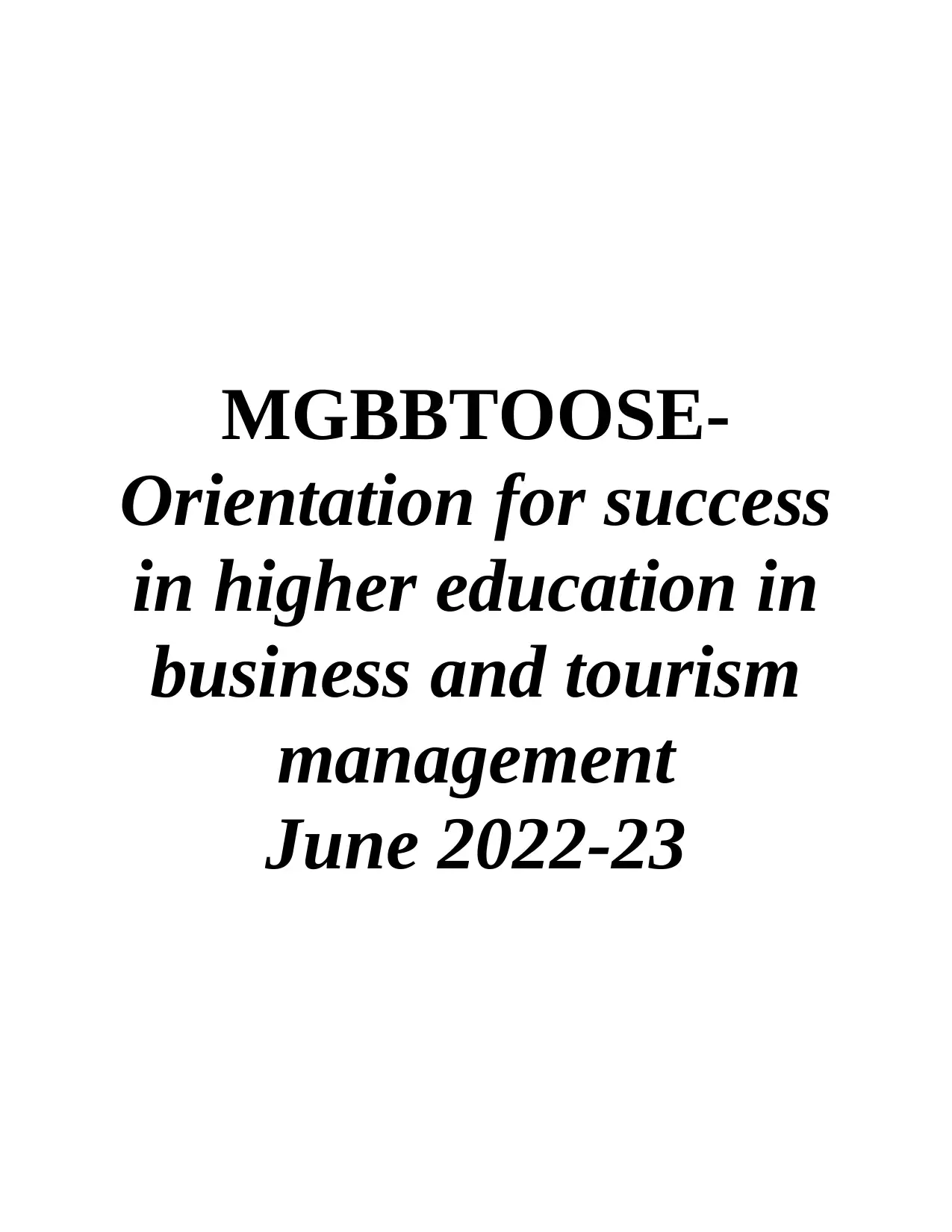
MGBBTOOSE-
Orientation for success
in higher education in
business and tourism
management
June 2022-23
Orientation for success
in higher education in
business and tourism
management
June 2022-23
Paraphrase This Document
Need a fresh take? Get an instant paraphrase of this document with our AI Paraphraser

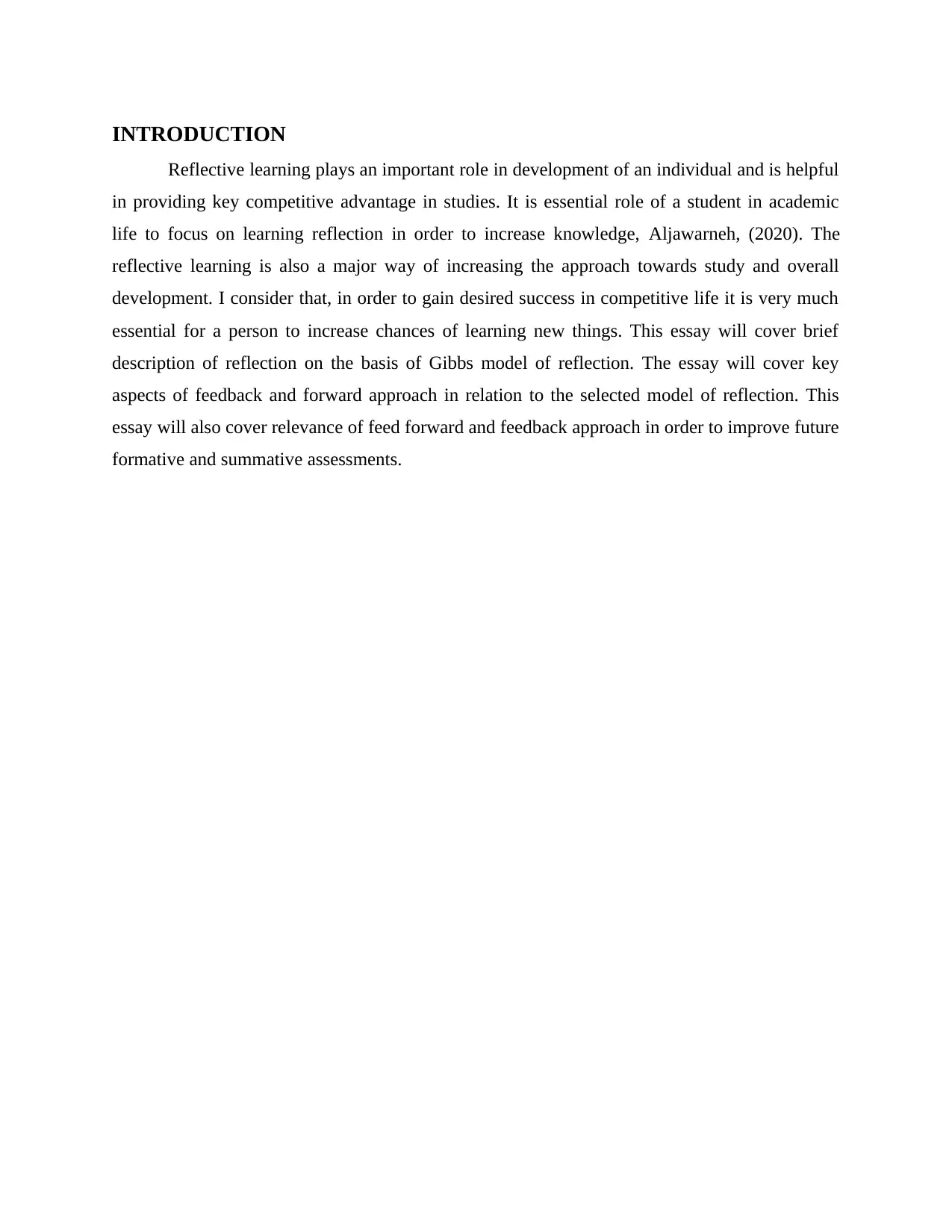
INTRODUCTION
Reflective learning plays an important role in development of an individual and is helpful
in providing key competitive advantage in studies. It is essential role of a student in academic
life to focus on learning reflection in order to increase knowledge, Aljawarneh, (2020). The
reflective learning is also a major way of increasing the approach towards study and overall
development. I consider that, in order to gain desired success in competitive life it is very much
essential for a person to increase chances of learning new things. This essay will cover brief
description of reflection on the basis of Gibbs model of reflection. The essay will cover key
aspects of feedback and forward approach in relation to the selected model of reflection. This
essay will also cover relevance of feed forward and feedback approach in order to improve future
formative and summative assessments.
Reflective learning plays an important role in development of an individual and is helpful
in providing key competitive advantage in studies. It is essential role of a student in academic
life to focus on learning reflection in order to increase knowledge, Aljawarneh, (2020). The
reflective learning is also a major way of increasing the approach towards study and overall
development. I consider that, in order to gain desired success in competitive life it is very much
essential for a person to increase chances of learning new things. This essay will cover brief
description of reflection on the basis of Gibbs model of reflection. The essay will cover key
aspects of feedback and forward approach in relation to the selected model of reflection. This
essay will also cover relevance of feed forward and feedback approach in order to improve future
formative and summative assessments.
⊘ This is a preview!⊘
Do you want full access?
Subscribe today to unlock all pages.

Trusted by 1+ million students worldwide
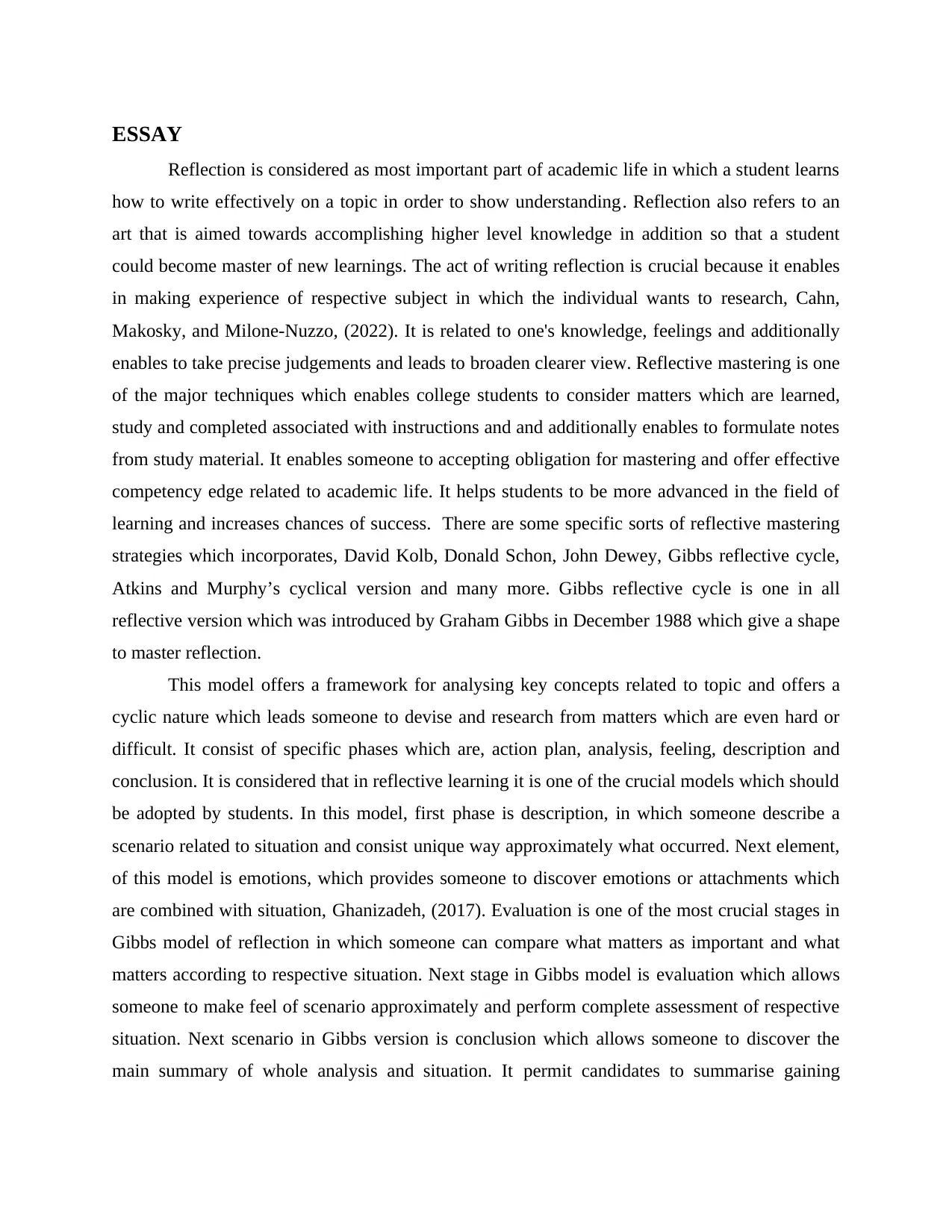
ESSAY
Reflection is considered as most important part of academic life in which a student learns
how to write effectively on a topic in order to show understanding. Reflection also refers to an
art that is aimed towards accomplishing higher level knowledge in addition so that a student
could become master of new learnings. The act of writing reflection is crucial because it enables
in making experience of respective subject in which the individual wants to research, Cahn,
Makosky, and Milone-Nuzzo, (2022). It is related to one's knowledge, feelings and additionally
enables to take precise judgements and leads to broaden clearer view. Reflective mastering is one
of the major techniques which enables college students to consider matters which are learned,
study and completed associated with instructions and and additionally enables to formulate notes
from study material. It enables someone to accepting obligation for mastering and offer effective
competency edge related to academic life. It helps students to be more advanced in the field of
learning and increases chances of success. There are some specific sorts of reflective mastering
strategies which incorporates, David Kolb, Donald Schon, John Dewey, Gibbs reflective cycle,
Atkins and Murphy’s cyclical version and many more. Gibbs reflective cycle is one in all
reflective version which was introduced by Graham Gibbs in December 1988 which give a shape
to master reflection.
This model offers a framework for analysing key concepts related to topic and offers a
cyclic nature which leads someone to devise and research from matters which are even hard or
difficult. It consist of specific phases which are, action plan, analysis, feeling, description and
conclusion. It is considered that in reflective learning it is one of the crucial models which should
be adopted by students. In this model, first phase is description, in which someone describe a
scenario related to situation and consist unique way approximately what occurred. Next element,
of this model is emotions, which provides someone to discover emotions or attachments which
are combined with situation, Ghanizadeh, (2017). Evaluation is one of the most crucial stages in
Gibbs model of reflection in which someone can compare what matters as important and what
matters according to respective situation. Next stage in Gibbs model is evaluation which allows
someone to make feel of scenario approximately and perform complete assessment of respective
situation. Next scenario in Gibbs version is conclusion which allows someone to discover the
main summary of whole analysis and situation. It permit candidates to summarise gaining
Reflection is considered as most important part of academic life in which a student learns
how to write effectively on a topic in order to show understanding. Reflection also refers to an
art that is aimed towards accomplishing higher level knowledge in addition so that a student
could become master of new learnings. The act of writing reflection is crucial because it enables
in making experience of respective subject in which the individual wants to research, Cahn,
Makosky, and Milone-Nuzzo, (2022). It is related to one's knowledge, feelings and additionally
enables to take precise judgements and leads to broaden clearer view. Reflective mastering is one
of the major techniques which enables college students to consider matters which are learned,
study and completed associated with instructions and and additionally enables to formulate notes
from study material. It enables someone to accepting obligation for mastering and offer effective
competency edge related to academic life. It helps students to be more advanced in the field of
learning and increases chances of success. There are some specific sorts of reflective mastering
strategies which incorporates, David Kolb, Donald Schon, John Dewey, Gibbs reflective cycle,
Atkins and Murphy’s cyclical version and many more. Gibbs reflective cycle is one in all
reflective version which was introduced by Graham Gibbs in December 1988 which give a shape
to master reflection.
This model offers a framework for analysing key concepts related to topic and offers a
cyclic nature which leads someone to devise and research from matters which are even hard or
difficult. It consist of specific phases which are, action plan, analysis, feeling, description and
conclusion. It is considered that in reflective learning it is one of the crucial models which should
be adopted by students. In this model, first phase is description, in which someone describe a
scenario related to situation and consist unique way approximately what occurred. Next element,
of this model is emotions, which provides someone to discover emotions or attachments which
are combined with situation, Ghanizadeh, (2017). Evaluation is one of the most crucial stages in
Gibbs model of reflection in which someone can compare what matters as important and what
matters according to respective situation. Next stage in Gibbs model is evaluation which allows
someone to make feel of scenario approximately and perform complete assessment of respective
situation. Next scenario in Gibbs version is conclusion which allows someone to discover the
main summary of whole analysis and situation. It permit candidates to summarise gaining
Paraphrase This Document
Need a fresh take? Get an instant paraphrase of this document with our AI Paraphraser
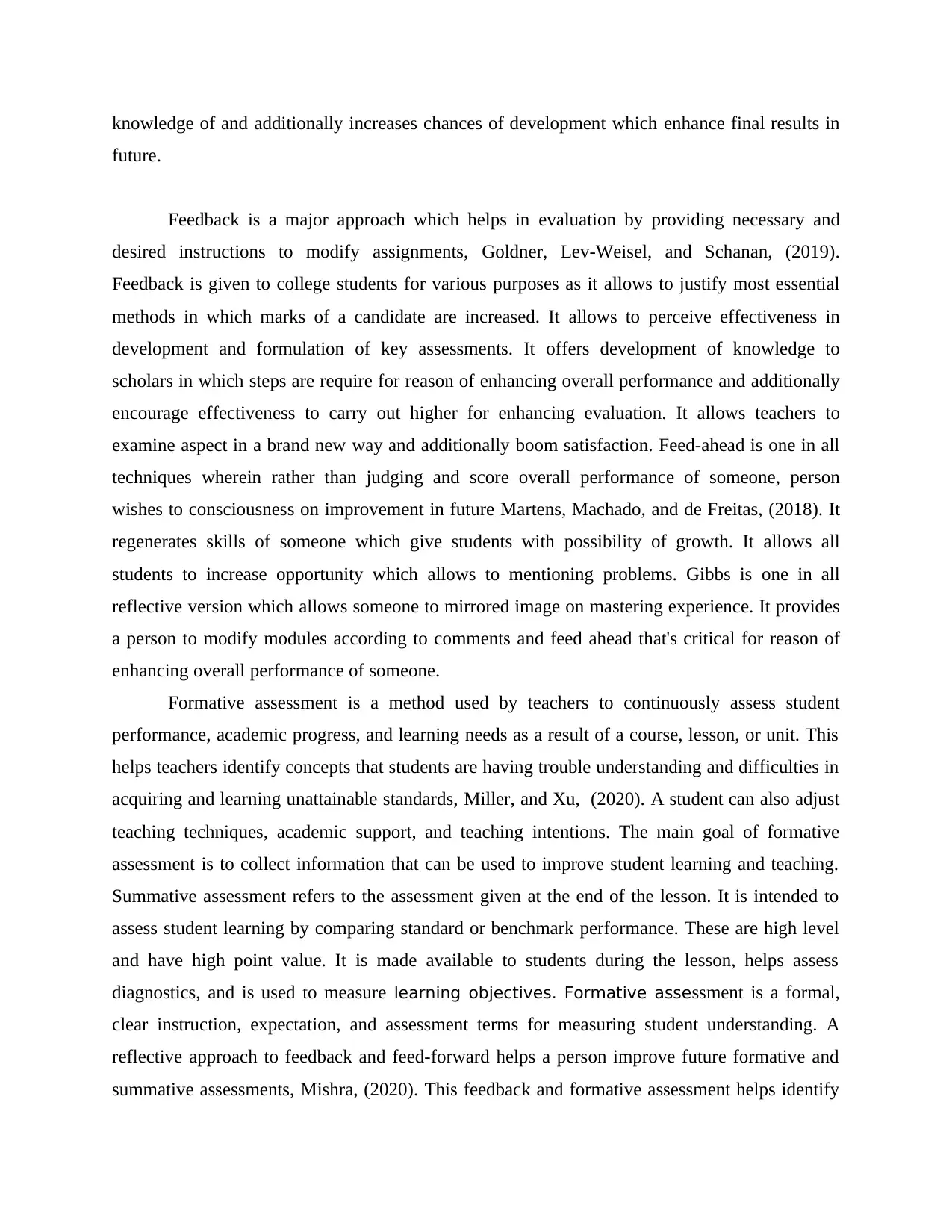
knowledge of and additionally increases chances of development which enhance final results in
future.
Feedback is a major approach which helps in evaluation by providing necessary and
desired instructions to modify assignments, Goldner, Lev-Weisel, and Schanan, (2019).
Feedback is given to college students for various purposes as it allows to justify most essential
methods in which marks of a candidate are increased. It allows to perceive effectiveness in
development and formulation of key assessments. It offers development of knowledge to
scholars in which steps are require for reason of enhancing overall performance and additionally
encourage effectiveness to carry out higher for enhancing evaluation. It allows teachers to
examine aspect in a brand new way and additionally boom satisfaction. Feed-ahead is one in all
techniques wherein rather than judging and score overall performance of someone, person
wishes to consciousness on improvement in future Martens, Machado, and de Freitas, (2018). It
regenerates skills of someone which give students with possibility of growth. It allows all
students to increase opportunity which allows to mentioning problems. Gibbs is one in all
reflective version which allows someone to mirrored image on mastering experience. It provides
a person to modify modules according to comments and feed ahead that's critical for reason of
enhancing overall performance of someone.
Formative assessment is a method used by teachers to continuously assess student
performance, academic progress, and learning needs as a result of a course, lesson, or unit. This
helps teachers identify concepts that students are having trouble understanding and difficulties in
acquiring and learning unattainable standards, Miller, and Xu, (2020). A student can also adjust
teaching techniques, academic support, and teaching intentions. The main goal of formative
assessment is to collect information that can be used to improve student learning and teaching.
Summative assessment refers to the assessment given at the end of the lesson. It is intended to
assess student learning by comparing standard or benchmark performance. These are high level
and have high point value. It is made available to students during the lesson, helps assess
diagnostics, and is used to measure learning objectives. Formative assessment is a formal,
clear instruction, expectation, and assessment terms for measuring student understanding. A
reflective approach to feedback and feed-forward helps a person improve future formative and
summative assessments, Mishra, (2020). This feedback and formative assessment helps identify
future.
Feedback is a major approach which helps in evaluation by providing necessary and
desired instructions to modify assignments, Goldner, Lev-Weisel, and Schanan, (2019).
Feedback is given to college students for various purposes as it allows to justify most essential
methods in which marks of a candidate are increased. It allows to perceive effectiveness in
development and formulation of key assessments. It offers development of knowledge to
scholars in which steps are require for reason of enhancing overall performance and additionally
encourage effectiveness to carry out higher for enhancing evaluation. It allows teachers to
examine aspect in a brand new way and additionally boom satisfaction. Feed-ahead is one in all
techniques wherein rather than judging and score overall performance of someone, person
wishes to consciousness on improvement in future Martens, Machado, and de Freitas, (2018). It
regenerates skills of someone which give students with possibility of growth. It allows all
students to increase opportunity which allows to mentioning problems. Gibbs is one in all
reflective version which allows someone to mirrored image on mastering experience. It provides
a person to modify modules according to comments and feed ahead that's critical for reason of
enhancing overall performance of someone.
Formative assessment is a method used by teachers to continuously assess student
performance, academic progress, and learning needs as a result of a course, lesson, or unit. This
helps teachers identify concepts that students are having trouble understanding and difficulties in
acquiring and learning unattainable standards, Miller, and Xu, (2020). A student can also adjust
teaching techniques, academic support, and teaching intentions. The main goal of formative
assessment is to collect information that can be used to improve student learning and teaching.
Summative assessment refers to the assessment given at the end of the lesson. It is intended to
assess student learning by comparing standard or benchmark performance. These are high level
and have high point value. It is made available to students during the lesson, helps assess
diagnostics, and is used to measure learning objectives. Formative assessment is a formal,
clear instruction, expectation, and assessment terms for measuring student understanding. A
reflective approach to feedback and feed-forward helps a person improve future formative and
summative assessments, Mishra, (2020). This feedback and formative assessment helps identify
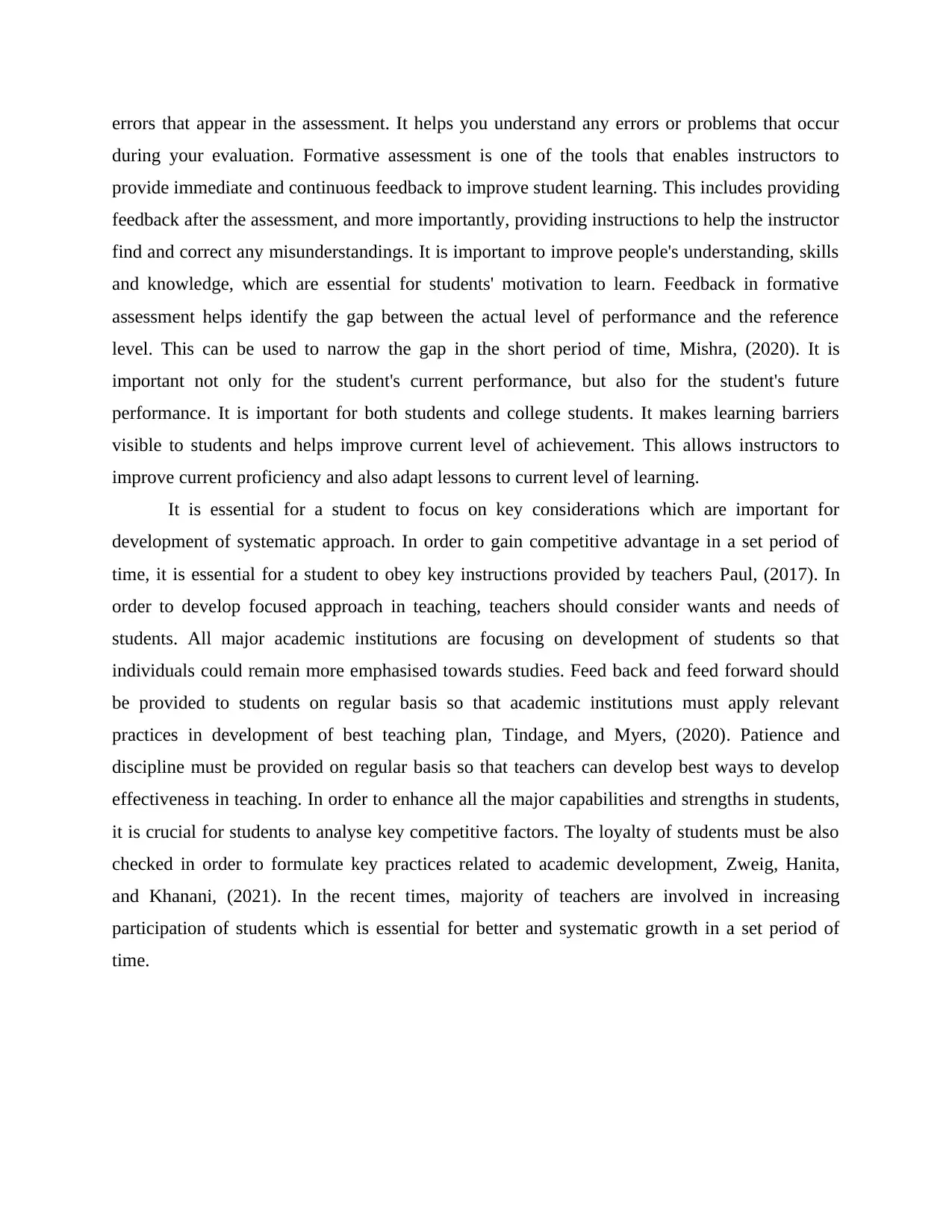
errors that appear in the assessment. It helps you understand any errors or problems that occur
during your evaluation. Formative assessment is one of the tools that enables instructors to
provide immediate and continuous feedback to improve student learning. This includes providing
feedback after the assessment, and more importantly, providing instructions to help the instructor
find and correct any misunderstandings. It is important to improve people's understanding, skills
and knowledge, which are essential for students' motivation to learn. Feedback in formative
assessment helps identify the gap between the actual level of performance and the reference
level. This can be used to narrow the gap in the short period of time, Mishra, (2020). It is
important not only for the student's current performance, but also for the student's future
performance. It is important for both students and college students. It makes learning barriers
visible to students and helps improve current level of achievement. This allows instructors to
improve current proficiency and also adapt lessons to current level of learning.
It is essential for a student to focus on key considerations which are important for
development of systematic approach. In order to gain competitive advantage in a set period of
time, it is essential for a student to obey key instructions provided by teachers Paul, (2017). In
order to develop focused approach in teaching, teachers should consider wants and needs of
students. All major academic institutions are focusing on development of students so that
individuals could remain more emphasised towards studies. Feed back and feed forward should
be provided to students on regular basis so that academic institutions must apply relevant
practices in development of best teaching plan, Tindage, and Myers, (2020). Patience and
discipline must be provided on regular basis so that teachers can develop best ways to develop
effectiveness in teaching. In order to enhance all the major capabilities and strengths in students,
it is crucial for students to analyse key competitive factors. The loyalty of students must be also
checked in order to formulate key practices related to academic development, Zweig, Hanita,
and Khanani, (2021). In the recent times, majority of teachers are involved in increasing
participation of students which is essential for better and systematic growth in a set period of
time.
during your evaluation. Formative assessment is one of the tools that enables instructors to
provide immediate and continuous feedback to improve student learning. This includes providing
feedback after the assessment, and more importantly, providing instructions to help the instructor
find and correct any misunderstandings. It is important to improve people's understanding, skills
and knowledge, which are essential for students' motivation to learn. Feedback in formative
assessment helps identify the gap between the actual level of performance and the reference
level. This can be used to narrow the gap in the short period of time, Mishra, (2020). It is
important not only for the student's current performance, but also for the student's future
performance. It is important for both students and college students. It makes learning barriers
visible to students and helps improve current level of achievement. This allows instructors to
improve current proficiency and also adapt lessons to current level of learning.
It is essential for a student to focus on key considerations which are important for
development of systematic approach. In order to gain competitive advantage in a set period of
time, it is essential for a student to obey key instructions provided by teachers Paul, (2017). In
order to develop focused approach in teaching, teachers should consider wants and needs of
students. All major academic institutions are focusing on development of students so that
individuals could remain more emphasised towards studies. Feed back and feed forward should
be provided to students on regular basis so that academic institutions must apply relevant
practices in development of best teaching plan, Tindage, and Myers, (2020). Patience and
discipline must be provided on regular basis so that teachers can develop best ways to develop
effectiveness in teaching. In order to enhance all the major capabilities and strengths in students,
it is crucial for students to analyse key competitive factors. The loyalty of students must be also
checked in order to formulate key practices related to academic development, Zweig, Hanita,
and Khanani, (2021). In the recent times, majority of teachers are involved in increasing
participation of students which is essential for better and systematic growth in a set period of
time.
⊘ This is a preview!⊘
Do you want full access?
Subscribe today to unlock all pages.

Trusted by 1+ million students worldwide
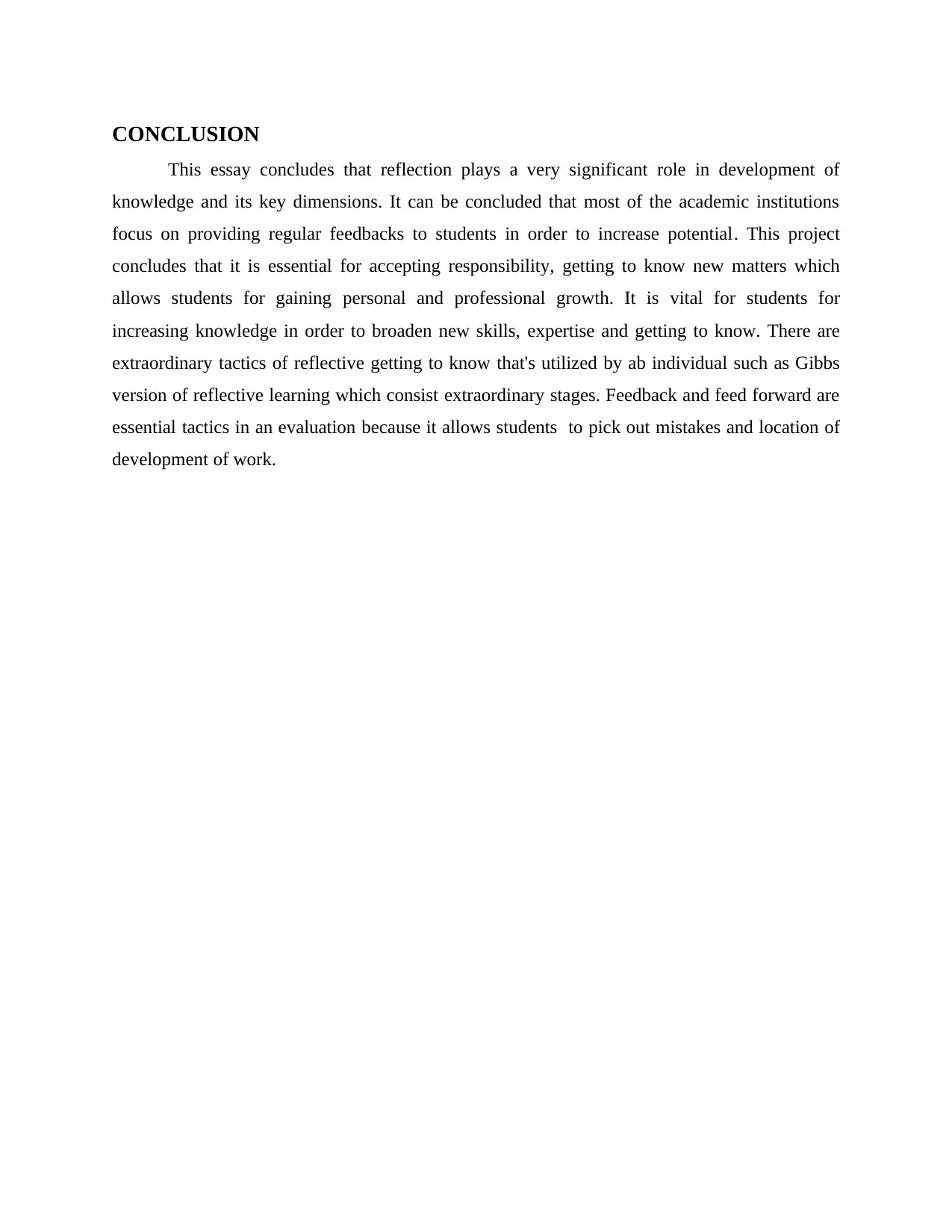
CONCLUSION
This essay concludes that reflection plays a very significant role in development of
knowledge and its key dimensions. It can be concluded that most of the academic institutions
focus on providing regular feedbacks to students in order to increase potential. This project
concludes that it is essential for accepting responsibility, getting to know new matters which
allows students for gaining personal and professional growth. It is vital for students for
increasing knowledge in order to broaden new skills, expertise and getting to know. There are
extraordinary tactics of reflective getting to know that's utilized by ab individual such as Gibbs
version of reflective learning which consist extraordinary stages. Feedback and feed forward are
essential tactics in an evaluation because it allows students to pick out mistakes and location of
development of work.
This essay concludes that reflection plays a very significant role in development of
knowledge and its key dimensions. It can be concluded that most of the academic institutions
focus on providing regular feedbacks to students in order to increase potential. This project
concludes that it is essential for accepting responsibility, getting to know new matters which
allows students for gaining personal and professional growth. It is vital for students for
increasing knowledge in order to broaden new skills, expertise and getting to know. There are
extraordinary tactics of reflective getting to know that's utilized by ab individual such as Gibbs
version of reflective learning which consist extraordinary stages. Feedback and feed forward are
essential tactics in an evaluation because it allows students to pick out mistakes and location of
development of work.
Paraphrase This Document
Need a fresh take? Get an instant paraphrase of this document with our AI Paraphraser
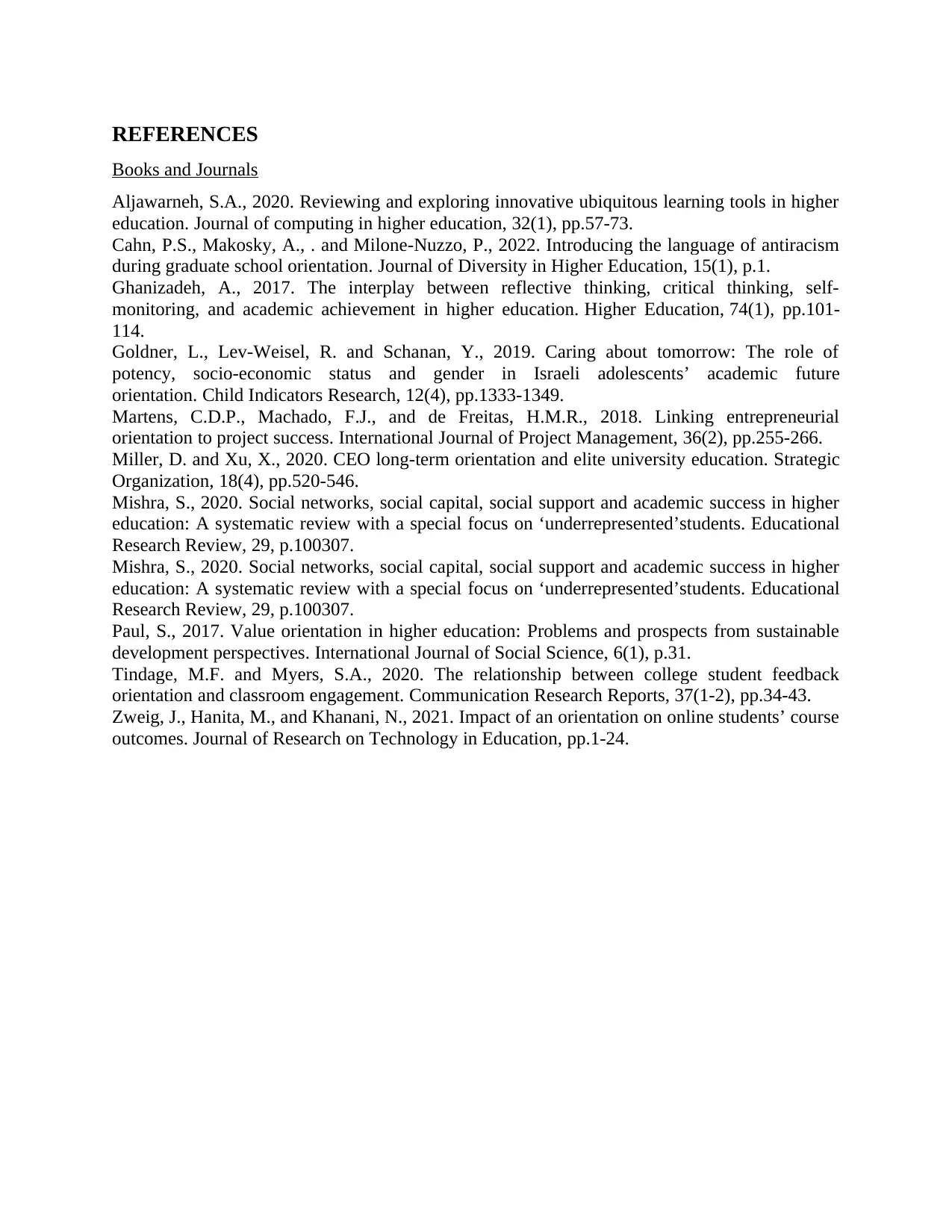
REFERENCES
Books and Journals
Aljawarneh, S.A., 2020. Reviewing and exploring innovative ubiquitous learning tools in higher
education. Journal of computing in higher education, 32(1), pp.57-73.
Cahn, P.S., Makosky, A., . and Milone-Nuzzo, P., 2022. Introducing the language of antiracism
during graduate school orientation. Journal of Diversity in Higher Education, 15(1), p.1.
Ghanizadeh, A., 2017. The interplay between reflective thinking, critical thinking, self-
monitoring, and academic achievement in higher education. Higher Education, 74(1), pp.101-
114.
Goldner, L., Lev-Weisel, R. and Schanan, Y., 2019. Caring about tomorrow: The role of
potency, socio-economic status and gender in Israeli adolescents’ academic future
orientation. Child Indicators Research, 12(4), pp.1333-1349.
Martens, C.D.P., Machado, F.J., and de Freitas, H.M.R., 2018. Linking entrepreneurial
orientation to project success. International Journal of Project Management, 36(2), pp.255-266.
Miller, D. and Xu, X., 2020. CEO long-term orientation and elite university education. Strategic
Organization, 18(4), pp.520-546.
Mishra, S., 2020. Social networks, social capital, social support and academic success in higher
education: A systematic review with a special focus on ‘underrepresented’students. Educational
Research Review, 29, p.100307.
Mishra, S., 2020. Social networks, social capital, social support and academic success in higher
education: A systematic review with a special focus on ‘underrepresented’students. Educational
Research Review, 29, p.100307.
Paul, S., 2017. Value orientation in higher education: Problems and prospects from sustainable
development perspectives. International Journal of Social Science, 6(1), p.31.
Tindage, M.F. and Myers, S.A., 2020. The relationship between college student feedback
orientation and classroom engagement. Communication Research Reports, 37(1-2), pp.34-43.
Zweig, J., Hanita, M., and Khanani, N., 2021. Impact of an orientation on online students’ course
outcomes. Journal of Research on Technology in Education, pp.1-24.
Books and Journals
Aljawarneh, S.A., 2020. Reviewing and exploring innovative ubiquitous learning tools in higher
education. Journal of computing in higher education, 32(1), pp.57-73.
Cahn, P.S., Makosky, A., . and Milone-Nuzzo, P., 2022. Introducing the language of antiracism
during graduate school orientation. Journal of Diversity in Higher Education, 15(1), p.1.
Ghanizadeh, A., 2017. The interplay between reflective thinking, critical thinking, self-
monitoring, and academic achievement in higher education. Higher Education, 74(1), pp.101-
114.
Goldner, L., Lev-Weisel, R. and Schanan, Y., 2019. Caring about tomorrow: The role of
potency, socio-economic status and gender in Israeli adolescents’ academic future
orientation. Child Indicators Research, 12(4), pp.1333-1349.
Martens, C.D.P., Machado, F.J., and de Freitas, H.M.R., 2018. Linking entrepreneurial
orientation to project success. International Journal of Project Management, 36(2), pp.255-266.
Miller, D. and Xu, X., 2020. CEO long-term orientation and elite university education. Strategic
Organization, 18(4), pp.520-546.
Mishra, S., 2020. Social networks, social capital, social support and academic success in higher
education: A systematic review with a special focus on ‘underrepresented’students. Educational
Research Review, 29, p.100307.
Mishra, S., 2020. Social networks, social capital, social support and academic success in higher
education: A systematic review with a special focus on ‘underrepresented’students. Educational
Research Review, 29, p.100307.
Paul, S., 2017. Value orientation in higher education: Problems and prospects from sustainable
development perspectives. International Journal of Social Science, 6(1), p.31.
Tindage, M.F. and Myers, S.A., 2020. The relationship between college student feedback
orientation and classroom engagement. Communication Research Reports, 37(1-2), pp.34-43.
Zweig, J., Hanita, M., and Khanani, N., 2021. Impact of an orientation on online students’ course
outcomes. Journal of Research on Technology in Education, pp.1-24.
1 out of 8
Related Documents
Your All-in-One AI-Powered Toolkit for Academic Success.
+13062052269
info@desklib.com
Available 24*7 on WhatsApp / Email
![[object Object]](/_next/static/media/star-bottom.7253800d.svg)
Unlock your academic potential
Copyright © 2020–2026 A2Z Services. All Rights Reserved. Developed and managed by ZUCOL.
